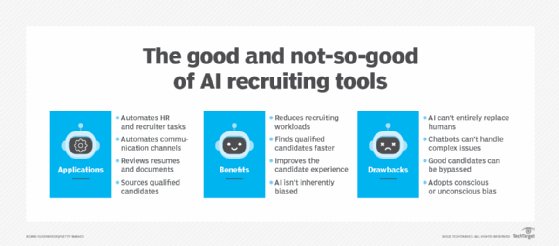Using AI for recruiting: Complete guide for HR pros
As companies battle to find and hire qualified talent, AI-powered software speeds processes, reduces recruitment workloads, improves candidate experiences and refines sourcing.
Recruiting has become a hotbed for artificial intelligence applications in HR. Companies are increasingly turning to this new range of AI-driven recruiting software, especially since the start of the COVID-19 pandemic, the Great Resignation of 2022 and the continuing struggle to find, hire and retain skilled workers.
What is AI recruiting and what is its purpose?
AI recruiting is the use of AI-powered software across recruiting processes. These software tools provide numerous ways to automate and streamline the recruiting process, allowing talent acquisition professionals and hiring managers to spend less time on time-consuming, repetitive and manual activities and more time where the talent acquisition process requires human intervention.
AI recruiting tools enable organizations to improve hiring practices by identifying more qualified candidates and sourcing additional candidates. The platforms can also improve the candidate experience by making it easier for job seekers to apply for open positions and communicate directly with the company. And in many instances, companies can integrate AI recruiting software with their existing applicant tracking system.
Common uses of AI technology in recruitment
Use cases of AI in the hiring process are many and varied, including process automation, resume and document reviews, and finding, hiring and sourcing candidates. More specifically, AI can do the following to streamline and improve the recruitment process:
This article is part of
Ultimate guide to recruitment and talent acquisition
- Automate repetitive and time-consuming tasks. Some parts of the recruiting process are repetitious, take time and don't necessarily require a human to add value to the process, such as scheduling interviews and reviewing resumes in bulk.
- Provide automated communication channels. AI-based tools such as chatbots and SMS-based communication enable candidates to communicate directly with the hiring company without intervention from recruitment agencies.
- Review large amounts of documents. AI recruiting tools review and verify large amounts of documents, which is often time-consuming for HR and recruiters. These documents can be resumes or employee paperwork like identification and verification documents.
- Source candidates. AI can handle the tedious and time-consuming task of finding and qualifying potential candidates who didn't apply for the advertised job.

Benefits of using AI for recruitment
AI's benefits throughout the recruiting process include reduced workloads, improved search and hiring processes, better candidate experiences and less chance of bias. More specifically, AI provides the following benefits:
- Reduces the recruiting workloads. Automation can drastically reduce the workload for hiring managers and recruiters, enabling them to focus on additional recruiting activities.
- Finds candidates more quickly. By scanning and sorting multiple sources of candidates, AI can speed and refine the search process, create talent pools for future sourcing and save HR recruiters significant time.
- Enhances the candidate experience. AI recruiting tools that offer intelligent chatbots or text messaging, for example, make it easier for candidates to interact with what they think are the company's recruiting teams.
- Neutralizes potential bias. Built to be objective and devoid of opinions and perceptions, AI can reduce or eliminate conscious or unconscious bias from the recruiting process and provide the best possible cross section of qualified candidates.
- Improves the quality of hire. AI can cover a wider range of sources for candidates, identify better candidates and provide an improved candidate experience.
Challenges of using AI for recruitment
Along with the benefits come some challenges that AI recruiting tools can't solve or still need to overcome, including the following:
- AI tools can't replace humans. Hiring managers and recruiters are still needed for some tasks, and AI recruiting tools don't automate the entire recruiting process. For example, someone is still required to interview a candidate or interact with the person responsible for the job requisition.
- Chatbots can't handle significant complexity. Many chatbots, as well as tools with similar capabilities, can answer simple questions, but they often hit a roadblock when encountering more complex queries. Many chatbots work from a decision tree: A user selects the answer to a question from several possible responses. But sometimes a query doesn't fit the criteria and human interaction is required.
- Suitable candidates can be missed. Based on AI criteria and algorithms used for sourcing candidates or reviewing large amounts of documents, suitable candidates that a hiring manager would normally spot can be missed. Given that candidates offer different skills, characteristics and experiences that are above and beyond education, qualifications and other criteria, a good candidate could simply go unnoticed, especially since recruiting can sometimes be quite subjective. A good candidate, for example, may be lacking in some areas but overcompensate in other areas, which AI may not distinguish like a human could.
- AI can learn bias. Depending on the behavior of the users, AI can potentially learn and apply human biases.
How will AI change the recruiter role?
AI recruiting tools won't remove the need for recruiters, but they do redefine and streamline the recruiting process. AI tools will reduce the time and effort recruiters spend on certain defined tasks. If an organization implements an AI recruiting tool for sourcing candidates, for example, recruiters will spend less time on sourcing activities, except to verify the sourcing results and ensure the sourcing operation has been effective. AI tools will also provide recruiters with more qualified candidates, sometimes in areas not searched by recruiters.
Best practices to use AI effectively for recruiting
To make the best use of AI in recruiting, it's important to prepare in advance and adhere to basic ongoing best practices, including the following:
- Identify areas that consume a lot of time, are costly and are handled manually.
- Adjust processes to accommodate AI deployments.
- Spot check the outcomes for accuracy once AI is deployed.
- Eliminate biased behavior at the outset to ensure the AI system doesn't incorporate those biases.
- Monitor and measure performance to ensure the AI system is adding value to the process.
AI recruiting tools and software
The AI engine typically automates common, repetitive tasks and can cover a wide range of recruitment functions, including chatbots, SMS-based AI interaction, screening and scheduling automation, candidate profile reviews, on-demand interview scheduling and sourcing automation. Following are just some of many AI recruitment software platforms:
- Humanly
- Eightfold AI
- Modern Hire
- HireVue
- Paradox








